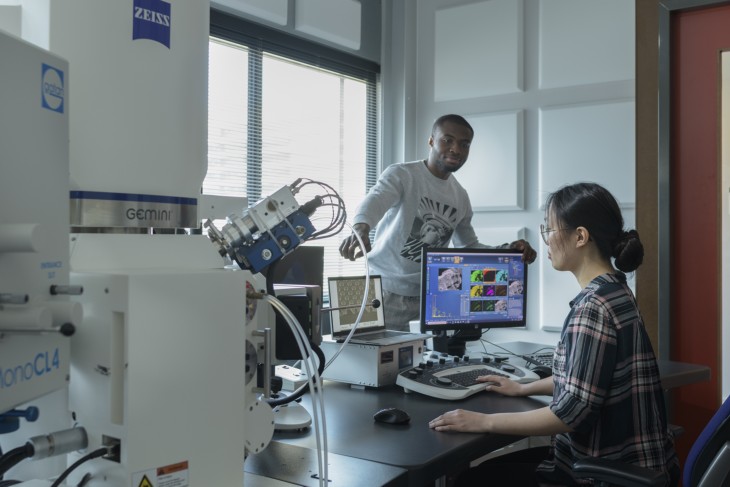By now, you’ve probably adjusted to life in Enschede somewhat – you’ve been here for a couple of weeks, and you’ve got a nice, good rhythm going with your classes and your activities. That’s why, for this article, I’m assuming you’re the average student: you go to your lectures, you’ve got a decent grasp on the material, and most importantly, you don’t need to cram.
1. Go to that last tutorial before the exam
If you’re planning on skipping that last tutorial before you dive into exam week, then I’d recommend that you don’t. Tutorials are a place to work, and while I personally get annoyed whenever the supervisors go up to the board and take the entire tutorial block to explain something, tutorials are also a good way of asking for help and seeing what you need to brush up on. Plus, if you decide to pay attention to the board, it could be that the supervisors are talking about something pretty important for the exam, which would be beneficial. For example, for some classes, your last tutorial could be the teacher doing a practice test that they didn’t give answers for!
2. Prioritise practice exams
Throughout your entire study week, you’ll (hopefully) have worked through most of the material, and just need to practise more. Well, you don’t have any excuses now: it’s the perfect time to do several practice tests – if your teacher provided some. I always try to go into my first practice test blindly, just to gauge how good I am at the material, and after I realise how badly I’ve done I make a mental list to practise those things. It’s okay to look at the answers sometimes, even if it is bad practice – how else are you going to get it? After the first practice test, I have my notes open for the next one, and maybe the following one, but at some point you need to learn how to do the exam problems yourself, and not follow your notes or the answers. The last two practice exams you should also do blindly, in my opinion.
3. Plan ahead, even a week before exam week
Knowing exactly what deadlines you have and on what days your exams are is crucial information. Moreover, it’s also helpful to know how much time you’re given to complete certain exams. This information should be enough to make a plan and study effectively during the most gruelling week of your module. I recommend making physical checkboxes whenever you reach a deadline or a goal, as it’s incredibly gratifying to tick something off and never look at it again (ideally).
However, I’d also watch out – a lot of people are guilty of overestimating how much time they’ve got and end up fitting too much into their schedules (read: me). You can only keep up with so much, after all, so it’s important to keep yourself fresh. Most of the time, a full working day (eight hours), from 9-5, is enough to really grasp something.
4. Take breaks and stay active!
Probably the most oversaid thing on any study guide or similar, taking breaks still hasn’t lost importance. If you like going to the gym or exercising, then don’t let your study week deter you from going: think of these things as a sort of outlet to release your frustrations for the day. Plus, exercise is amazing for the brain, so keeping yourself active is also a means of refreshing your brain for the studying that’s going to come.
As for taking breaks – again, I can’t stress how important it is for yourself to stop when you need to stop. Sometimes a small break is needed, and that can be anything from taking a walk or refilling your water bottle to getting food at Coop if you’re in the area. You don’t need to set arbitrary times for when to take a break – just study until you’re sick of it, I suppose, and then that’s your body telling you that you need a break.
5. Treat yourself
Sure, taking breaks and going to the gym after a long day can also be a form of treating yourself. When it’s study/exam week, however, I tell myself it’s okay to go a bit above budget on snacks. I had a recent conversation with a friend about how I must have spent €15 on croissants during one study week alone, and he was so taken aback that he asked if I was all right in the head (I’m all right, I assure you :D).
Anyway, I say that since your mind is so preoccupied with your studying and other priorities, it needs an easy way to get nutrients and food. That doesn’t mean you should be constantly getting take-out every day of the week – no, that’s a horrible idea, and I mean it – but that it’s okay to do it once or twice. You can also get something instant and quick and have that be your meal. Instant gratification is, typically, a horrible form of maxing out your happiness, but sometimes you feel lazy and want something for the sake of wanting something. After a long day at the desk, you deserve it – do what you crave the most, what you daydream about when you’re pouring over those long formulas.
6. Remember that you’re not alone
There are many other students around you sitting in the same boat as you are. Make your lives easier by studying together, be it in a study group or within each other’s presence, and treat yourself to a nice lunch or break with them when the time comes for it. If you’re getting overwhelmed, and feel like you can’t go on, remember that your friends are friends for a reason: talk to them! Other students may be feeling the same way. Most of the time, giving up is not an option, but no one’s going to care if you complain a bit, so make sure you’re venting out your frustrations in a healthy manner. Sometimes all you really need is to rant about a couple of things, take a deep breath, and drink some water. Many other students have done it before – you can do it as well!
7. It’s definitely not the end of the world!
Strangely, I tend to think that it’s a blessing when all you have to worry about, really, is your academic performance. It’s a blessing to realise that the world won’t end when exam week comes. Be confident in your own abilities and skills, and you’ll ease your panic. Sometimes, it doesn’t work out, but failure isn’t the end, and it’s more important to try your best anyway and maintain a healthy relationship with your studies and other aspects of your life.
Regardless of how you feel and how prepared you are for your exams, I wish you all the best of luck for the upcoming exams, and all other exams to come!




